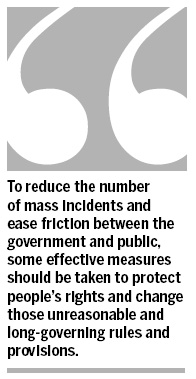Op-Ed Contributors
Great wall vital for people's rights
By Yu Jianrong (China Daily)
Updated: 2010-03-11 07:51
 |
Large Medium Small |
Social unrest and mass protests can be prevented if the abuse of power is checked and antiquated rules are appraised
Eruptions of social disorder and protests will trouble China this year as they did in recent years, but they will continue to be confined to several regions.
These events of social unrest are unlikely to escalate into a large-scale and consistent mass movement across the nation and unlikely to alter China's political landscape.
But there is a caveat. Any ill-conceived government measures, such as its stubborn adherence to the belief that non-violent and public demonstrations, protests and strikes would constitute a major threat to their rule, could possibly force these peaceful incidents into a position that the government will not be able to control. That would bring some political risks to authorities.
To defuse social contradictions and potential conflicts that are stewing in this country, some practical measures should be taken to mitigate the strained ties between some local governments and citizens that remain tense in several regions.
Some unreasonable rules and regulations that have long governed society should be rewritten to put citizens' rights from the Constitution into force. One of the biggest embarrassments facing China's law is that from time to time it is overridden by administrative power. The country's "rule of law" has not been fully fulfilled.

Facts prove that many clauses of the country's laws fail to protect people's rights and interests while their rights bestowed upon by the Constitution turn out difficult to be fulfilled. All these have deepened public consciousness that they would face an uphill task in fighting for their legal rights. A typical case is China's regulation on home demolitions and urban resettlement. Although the regulation has become a source of public dissatisfaction and violent confrontations, the country's property law and Constitution have failed to help homeowners fend off these violent demolitions. As a result, it's not uncommon for some to take some extreme actions to fight off brutal demolitions, such as self-immolation and attacking, sometimes killing demolishers.
The law's inability or failure to protect their rights has further fomented public resentment toward local governments. Instead of directly confronting local governments, people who feel unprotected are choosing to spread rumors and their dissatisfaction via the Internet or cell phones when an infringement upon public rights takes place. At times when an individual's complaint or issue is mishandled, the situation will turn awry and extreme actions, even violence, result.
It is also common for people whose resentments have been repressed and who have no outlets to vent their angst to burst out in an unexpected manner even if their rights are not directly violated. That could explain why some common criminal and civil cases, which could have been resolved through the legal framework, escalate into violence and even into large-scale social unrest.
To reduce the number of mass incidents and ease friction between the government and public, some effective measures should be taken to protect people's rights and change those unreasonable and long-governing rules and provisions.
But any effort to rewrite unreasonable rules is expected to be a long process. That makes it necessary for the country to gradually find practical solutions.
On the other hand, measures should be adopted to check unbridled public power to ease public dissatisfaction and mitigate social unrest. Facts prove that people's declining trust in public power has ultimately caused a number of mass incidents in recent years.
The eruption of the Shishou Incident in Hubei province last June was mainly because of the lack of trust among local residents in the ability of the local officials to maintain social order and judicial justice. The lack of trust mainly comes from the increasing number of inequalities in society.
As the market economy develops and reform deepens, the diversification of China's social stratum, interests of groups and their values has accelerated, and the gap between the rich and poor and between urban and rural areas have become more pronounced. Poverty and inequality have become much worse. All these problems will surely continue to drain people's confidence in local governments in maintaining social justice and equality. To recover public trust, the abuse of public power, a source of social injustice, should be checked.
To rein in public power, the country's current system of the National People's Congress should be improved. For instance, more competitive elections of congressional deputies should be adopted. Communications between deputies and voters should be improved. If this happens, deputies will be forced to share their opinions with voters and to exercise checks on public power if elected.
Workable measures should also be taken to maintain the authority of the Constitution and give the country's judicial body a bigger role in restraining grassroots governments. Concrete steps should also be taken to separate courts at the intermediate and grassroots levels to keep local governments and local officials from intervening in the handling of cases.
The author is a researcher with the Institute of Rural Development under the Chinese Academy of Social Sciences.
(China Daily 03/11/2010 page9)









